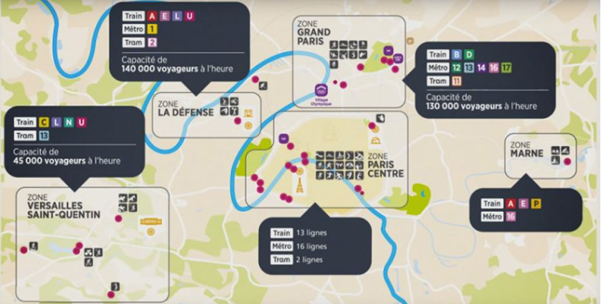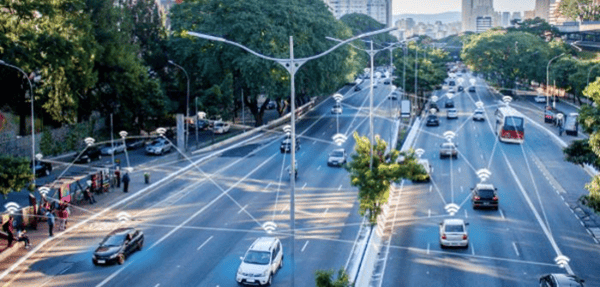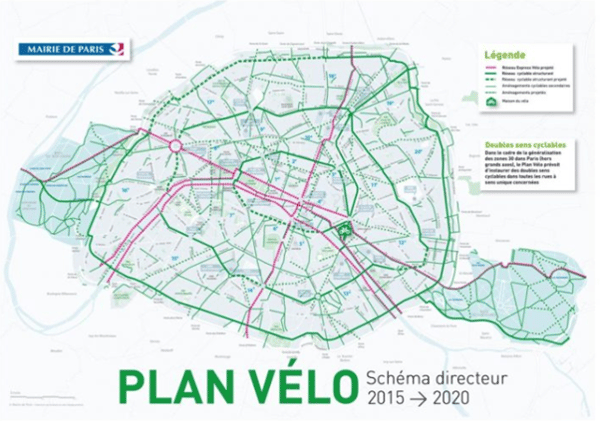All eyes right now are on France, and more precisely, Paris. Can France win the mobility gold medal to promise a successful climb on the podium as the smartest city in Europe? The host capital city of the 2024 Olympic and Paralympic Games, which has a combination of the most complex and high-performance, as well as controversial, transport systems in Europe, faces many challenges.
In fact, organizing the biggest global and international sporting event, which involves huge stakes for the economy and tourism, means the French capital must find ways to establish a rapid and effective plan to transform its transport infrastructure and digitize the city.The reception of the Olympic games will allow France to reinforce and expand its “soft power”, the games being a huge opportunity to showcase a country’s culture, values and image to the world. A good example was the Beijing Olympic games in 2008, when China really delivered to create a beautiful event by considering environmental as well as social issues.

Source: https://www.transportshaker-wavestone.com/jo-2024-quels-impacts-sur-la-mobilite-du-grand-paris-12/
After having received much criticism during the Olympic Games in Rio, mobility is a crucial challenge for the 2024 Games. While France’s vision was based on the promise that the Île-de-France transport network will be the “best public transport system in the world” not only Europe, the region still has a long way to go if it is to achieve the objectives it has set for improving accessibility, ensuring environmental responsibility, performance and space management.
This will be an unprecedented tourist experience that will change and shape Paris. The Île-de-France region and other regions will have to prepare with great care in order to reap all the benefits. The most recent examples (Rio, London, Sochi...) show that the operation is particularly delicate in terms of managing the Olympic event: forecasting and managing the flow of visitors, optimal orientation of unique foreign visitors, offering a feeling of "support", multi-lingual reception, transporting athletes' equipment from all over the world to the Olympic village, finding a way to absorb the upcoming surge of newcomers (space management), etc.
The capital city faces many persistent problems such as: a lack of accessibility for people with reduced mobility, frequent interruptions due to repairs, congestion, breakdowns and failures, the existence of physical transport tickets, missing or incorrect information, transportation services in the Île-de-France region have achieved mixed results. The public opinion is divided by those who think the Paris transportation system is enough and those who are dissatisfied with the old mobility ecosystem.
The region’s vast transport network and infrastructures, however, are essential for the hosting of the Olympic Games in the summer of 2024. The city’s bid and projected efforts was based on the strength of its network, as well as major renovation works intended to create capacity for large numbers of tourists expected to come in masses to support their country's athletes. Many new spaces will have to be created to address issues related to the lack of spaces, especially parking spots.

Source: https://www.transportshaker-wavestone.com/jo-2024-quels-impacts-sur-la-mobilite-du-grand-paris-12/
For Paris, preparing the Olympic Games is an opportunity to kickstart its major transformation towards the widespread use of smart technologies and finally earn the title of ‘smart city’. This urban challenge promises to make everything more interconnected starting with the users themselves. This is necessary in order to increase the attractiveness of the most visited city in the world. This mobility renewal driven by French tech poses an extremely important image challenge for the city, which is directly linked to the economic stakes involved in the Olympic Games.
Paris must remodel its transportation system in order to provide a simple, accessible and pleasant experience for its many future visitors and passengers.
Being in Olympic shape is a major challenge for transports in Ile-de-France. With Paris 2024 on the horizon, there is an opportunity to find new solutions for the critical challenges of sustainable local growth (saturation of infrastructures, pollution, accessibility, parking management, etc.), while putting users, rather than transportation modes, at the center of the mobility offering. This reinvention is built on current technological developments in three areas: connected mobility (having a WiFi connection in public transport hubs), zero emissions and autonomy.
The Grand Paris Express, the largest construction site in Europe, has just started in Ile-de-France. 200 kilometers of automatic metro will be built around the capital, in addition to the construction of 68 brand new stations and the renovation of 750 stations. Particular attention has also been paid to the accessibility of transportation. By 2024, the main stations and all surface public transit will be accessible to people with reduced mobility. 25 billion euros is the amount budgeted for this grandiose project.

Source: https://www.transportshaker-wavestone.com/jo-2024-quels-impacts-sur-la-mobilite-du-grand-paris-12/
One of the major problems of Ile-de France is that suburban trains and metros are not easily accessible. The region must open up to more possibilities, especially in regard to the Paralympic games. The objective is to make at least 60% of the network accessible, by providing more information, options and assistance. The first supermetro trains are set to enter service in 2022. These technologies will finally be fully equipped for passengers with reduced mobility.
While the development of public transportation is without question necessary, there will still be issues concerning congestion all around the city. Many people will still need their cars to access train and subway stations; traffic is sure to be important around those areas. Parking management in Paris is still messy, not being much developed and improved. This is an important problem that needs to be looked into, as the main problem for congestion in a city is mainly caused by inefficient parking management. How to reduce the flux of people driving to important hubs is a question that needs more emphasis and action. Companies such as BePark, who specializes in parking optimization, offer options, alternatives and even new considerations regarding parking stock management.
To guarantee that the organization of the Paris Olympic Games does not become a burden on the city and the entire country, it is essential for this project not to be separated from the city’s overall urban strategy; on the contrary, it must be part of a sustainable dynamic for the city. It must fuel the cities innovation and accompany the other urban projects for Paris to become one of the “smartest” cities. To answer to the various challenges and attain the objectives, many solutions are proposed.
Create favorable conditions for users’ experience: The goal here is to provide new answers to the critical issues of sustainable territorial growth (infrastructure saturation, pollution, accessibility, etc.), while putting the user, and no longer the mode of transport, at the center of the mobility offer. As mentioned earlier in the article, this reinvention must and will be built around three technological breakthroughs, namely connected mobility, zero emissions and autonomy, and three usage breakthroughs, namely on-demand mobility, shared mobility and co-modality.
Aiming for connected transportation: The goal here is to provide travelers with real-time analysis of traffic flows, autonomous vehicles in the Olympic village, and WiFi in the metro to guarantee information access. The first challenge of this new generation of public transit will be to integrate connected technologies in order to give passengers a richer and, above all, more reliable experience. Major industrial companies and numerous startups are working together to provide enhanced transportation services and answer these transportation challenges.

Source: Google image
Use greener mobility: The Île-de-France region’s aim is unambiguous; 100% of spectators will be able to access a public transportation solution to travel to competition venues. This challenge is ambitious: there are no plans to provide parking lots near venues, in order to encourage people to leave their cars at home during this extremely busy period. This infrastructure choice will enable the City of Paris to make greener transportation modes, such as the bicycle, more accessible. 73% of spectators should be able to reach competition venues by bicycle within 30 minutes from the center of the capital city, and many facilities will be provided to encourage people to get around the city with no gas emissions. 1,400 kilometers of bicycle paths will be built inside Paris and in the Paris suburbs; the goal is to increase bike users to 15% from 5%.

Source: https://www.transportshaker-wavestone.com/jo-2024-quels-impacts-sur-la-mobilite-du-grand-paris-12/
Responding to the challenges of lack of space: Finally for our case, BePark is specialized in parking stock (over or undersized) management, the management and optimization of traffic flows and the improvement of customer experience via digital means (accessible to everyone). We are proud to offer a fully digital and connected customer centered service. Using our intelligent access systems, smart platforms and wide network, we can efficiently offer tailored solutions to answer different needs. In fact, our business model is focused on shared economy, promoting sustainable developments, which is part of the Smart Mobility approach, through parking optimization.